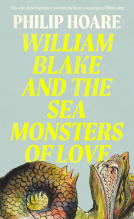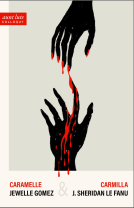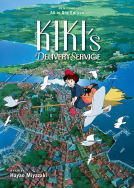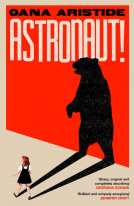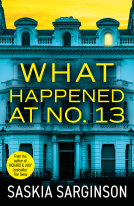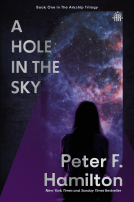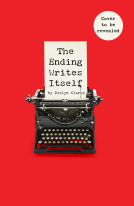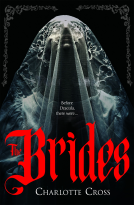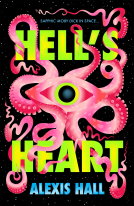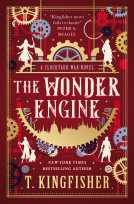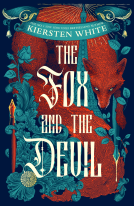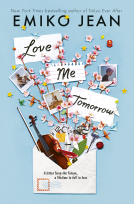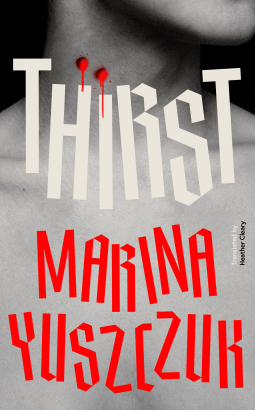
Thirst
by Marina Yuszczuk (trans. Heather Cleary)
This title was previously available on NetGalley and is now archived.
Send NetGalley books directly to your Kindle or Kindle app
1
To read on a Kindle or Kindle app, please add kindle@netgalley.com as an approved email address to receive files in your Amazon account. Click here for step-by-step instructions.
2
Also find your Kindle email address within your Amazon account, and enter it here.
Pub Date 24 Oct 2024 | Archive Date 8 Nov 2024
Talking about this book? Use #Thirst #NetGalley. More hashtag tips!
Description
‘It takes courage to write about vampires: they are the greatest of monsters, but also the most trivialised. Marina Yuszczuk manages to bring hers to life in this intimate take on the genre, which also weaves together grief, the history of Buenos Aires, and the voracity of desire.’
MARIANA ENRIQUEZ, AUTHOR OF OUR SHARE OF NIGHT
Across two different time periods, two women confront fear, loneliness, mortality, and a haunting yearning that will not let them rest. A breakout, genre-blurring novel from one of the most exciting new voices of Latin America’s feminist Gothic.
In the nineteenth century, a vampire arrives from Europe to the coast of Buenos Aires, on the run from the Church. She must adapt, intermingle with humans, and, most importantly, be discreet.
In present-day Buenos Aires, a woman finds herself at an impasse as she grapples with her mother’s terminal illness and her own relationship with motherhood. When she first encounters the vampire in a cemetery, something ignites within the two women — and they cross a threshold from which there’s no turning back.
With echoes of Mary Shelley’s Frankenstein and written in the vein of feminist Gothic writers like Shirley Jackson, Daphne du Maurier, and Carmen Maria Machado, Thirst plays with the boundaries of genre while exploring the limits of female agency, the consuming power of desire, and the fragile vitality of even the most immortal of creatures.
Advance Praise
‘It takes courage to write about vampires: they are the greatest of monsters, but also the most trivialised. Marina Yuszczuk manages to bring hers to life in this intimate take on the genre, which also weaves together grief, the history of Buenos Aires, and the voracity of desire.’
MARIANA ENRIQUEZ, AUTHOR OF OUR SHARE OF NIGHT
‘This gripping tale is full of queer representation and lush, lyrical passages, all while exploring death with an air of nihilism … Vampires are making a comeback, and Yuszczuk is spearheading their revival with this bloody novel.’
THE NEW YORK TIMES
‘Two women walk the streets of Buenos Aires two centuries apart. They are connected by exile and blood: the exile of a vampire who fled Europe like so many others, and the exile of a woman on the brink of orphanhood; the blood of kinship and the blood of death. Marina Yuszczuk masterfully blends past and present, the intimate and the historical, and the literary traditions that have shaped Argentine literature into what it is today to create a sensual and deeply personal novel.’
FERNANDA TRÍAS, AUTHOR OF PINK SLIME
‘Thirst cleverly pulls you in with its melancholy prose and its setting and its haunting mood and before you know it you’ve read the whole thing while chewing on your hair. An evocative tale that both recalls and subverts the classic gothic vampire novel. What a mesmerising read.’
VIRGINIA FEITO, AUTHOR OF MRS. MARCH
‘There is the powerful beat of a gothic heart in this gripping, dark, and sensual novel. Intimate and piercing, it manages to dissect maternal love while examining the nature of desire. A captivating and thrilling read.’
LUCIE MCKNIGHT HARDY, AUTHOR OF DEAD RELATIVES
‘Mesmerisingly translated by Cleary, Yuszczuk’s prose is meticulous, vibrant, propulsive, and masterfully paced. Her characterisations will stir readers’ emotions, empathy in particular; we suffer characters’ longing, their mournful feelings of being locked into inescapable circumstances. Thirst is an intense, haunting, and captivating novel that draws readers in from beginning to end.’
LILLIAN DABNEY, BOOKLIST
‘If we’re in the midst of a vampire renaissance, Marina Yuszczuk’s bloody, seductive contribution arrives with fangs bared. Dark as a bat’s wing, Thirst feels like Carmen Maria Machado meets Anne Rice, with a backdrop of Buenos Aires. Absolutely exquisite.’
ALICE SLATER, AUTHOR OF DEATH OF A BOOKSELLER
‘Thirst is unlike anything I’ve read before. The narrative is so gripping and immersive, and the characters jump off the page, they feel so real!’
CHLOE MICHELLE HOWARTH, AUTHOR OF SUNBURN
Available Editions
| ISBN | 9781914484643 |
| PRICE | £16.99 (GBP) |
| PAGES | 256 |
Links
Available on NetGalley
Average rating from 51 members
Featured Reviews
Thirst is a vampire novel, telling the story of two different women in Buenos Aires across two time periods. In the nineteenth century, a female vampire escapes Europe and the dangers of hiding those she must kill to satisfy her thirst, ending up in disease-ridden Buenos Aires where she can haunt the streets, but still she knows the danger of her need to take blood. And then in the present day, a woman deals with her ill mother and how to explain it all to her young son, whilst also being given a mysterious key to something in a crypt.
This is first and foremost a gothic novel, following in the vein of particularly nineteenth-century gothic novels that use their tropes and atmosphere to explore present concerns. In Thirst's case, this is fear and loneliness, and the isolation of sadness, as well as elements of women's roles in society, and the changing city of Buenos Aires. The first half of the novel tells the story of our vampire, her struggle to drink blood whilst remaining hidden, and her desires and the ways in which sex, desire, and blood-sucking intermingle. It tells a similar story to many vampire novels, old and new, with the battle between thirst and loneliness and monstrosity. It is harsh and bloody, with a great atmosphere.
The second half of the novel is from the perspective of a woman in the present day, who cares for her young son and faces her ill mother's impending death. When she's given information about a mysterious crypt from her mother, you know where the book is going, but it takes a long time to get there, and this section's tone is much more about the woman's sadness and her struggles to cope than the vampire element until the very end. The style, like a diary, brings it back to the gothic novel, however, and there's some interesting thoughts about creation and agency throughout.
I love a vampire novel, and it is interesting how Thirst plays with being a very traditional vampire novel, and also a story about grief and sadness that almost forgets the vampire part for a while. It is a book about uncontrollable desire, and the loss of desire, and whilst the two halves don't entirely come together, I enjoyed it nevertheless.
Marina Yuszczuk’s *Thirst* offers a fresh take on the vampire mythos, set against the rich historical backdrop of Buenos Aires. Far from being a simple supernatural thriller, this novel intertwines the gothic with the deeply personal, exploring themes of grief, desire, and the inexorable passage of time. The narrative is a compelling blend of the intimate and the historical, creating a story that is as much about the city and its past as it is about the characters themselves.
The novel is structured around two parallel narratives: one following a vampire through the centuries fleeing Europe and adapting to life in Buenos Aires, and the other in the present day, centering on a woman grappling with her mother’s terminal illness and her own ambivalent feelings toward motherhood. This split perspective not only enriches the story but also allows Yuszczuk to delve into the contrasts and connections between different eras, offering a poignant reflection on how the passage of time shapes human experience.
The portrayal of Buenos Aires is particularly evocative, with the city’s history and landscape almost becoming a character in its own right. The cemetery scenes are especially striking, transforming these spaces of death into places of eerie beauty and contemplation. This atmospheric setting not only enhances the gothic tone of the novel but also underscores the themes of loss and mortality that permeate the narrative. If you're like me, the novel might even evoke a desire to visit Buenos Aires, drawn by the vivid descriptions and the haunting allure of its cemeteries.
The vampire character in is a fascinating study in contradictions. She is both predator and protector, an outsider who must navigate the complex social fabric of human society while concealing her true nature. Through her eyes, Yuszczuk explores the dualities of power and vulnerability, desire and restraint. The vampire’s perspective offers a fresh lens through which to examine the human condition, particularly the ways in which we deal with fear, loneliness, and the inevitability of death.
However, it is in the present-day narrative that *Thirst* truly resonates on a deeply emotional level. The protagonist’s struggle with her mother’s degenerative illness is portrayed with unflinching honesty, capturing the complex and often contradictory feelings that arise when faced with the slow, painful decline of a loved one. This aspect of the novel struck a personal chord with me, The depiction of the emotional stasis caused by long-term caregiving is both poignant and painfully accurate, making this a novel that will likely resonate with anyone who has experienced the gradual loss of a family member.
While the first half of *Thirst* is gripping and immersive, the second half does lose some of its momentum. Yet, this is perhaps inevitable given the nature of the narrative, where the human protagonist is quite literally up against a vampire. Despite this slight dip in pacing, the novel remains a powerful exploration of grief, desire, and the limits of female agency.
I really enjoyed this book, now to book my plane tickets to Argentina...
 Reviewer 1222028
Reviewer 1222028
In the first part this novel, Marina Yuszczuk beautifully evokes a rich, haunting atmosphere in Buenos Aires' past as our narrator, an unnamed vampire, witnesses the city developing around her from its infancy. This section is a character study of a unique being trying to carve out an existence and experiencing the profound loneliness of an immortal life.
The second part of this novel is also set in Buenos Aires, but this time in the present day. The narrator is a single mother who is struggling to cope with her own mother's degenerative disease. Similar to the first half, the plot is fairly sparse, with the focus primarily on the emotions of the main character.
The tone varies between melancholy and reflective to violent and sexually charged, and all of it is executed brilliantly by the author! Honestly, I don't really read much gothic lit but now I'm going to look for more!
 Andy V, Bookseller
Andy V, Bookseller
"Thirst" is a chilling and sensual novel that takes the classic gothic aesthetic of the Vampire and yanks it forward to the 21st Century.
It's neatly divided into two quite separate but linked narratives: the first part of the book is an exquisite and incredibly atmospheric recounting of the life of a centuries-old European vampire woman through the ages, while the second part is the touching exploration of grief of a modern day woman that is dealing with the degenerative and terminal illness of her mother.
I have to admit, whilst each of the two narratives was incredibly well-written, very emotionally compelling and with interesting and complex themes; the two put together felt a bit too disconnected from each other that took something away from two otherwise great character studies.
Overall, I think this book had an amazing prose, fleshed-out characters with strong motives and a great deal of agency, and a good exploration of Death and how it affects those of us that are more closely-touched by it.
The novel follows an named female vampire from Europe to Buenos Aires in the 19th Century; following her life as a newly turned vampire to her fight for survival in a new country that becomes ravaged with a plague. The novel also follows a modern day timeline with a woman with a young son whose mother is slowly dying of fatal disease.
I really like the dual timelines that were so different for both women but both had loneliness and sadness running through them. This was a very disquieting and insidious novel that I felt long after I had finished the last page. 4 stars.
Thank you to Netgalley and the publisher for a copy of the novel in exchange for an honest review.
Thirst references many tales of revenants that have come before it, situated both in the nineteenth century (the rise of the vampire novel) and the modern day. Our unnamed temptress’ origins echoes the folklore that allowed the proliferation of the supernatural entity to exist (and alluding to its own famous tales like Dracula, Carmilla, and A Dowry of Blood). Set in Bueno Aires, the vampire is literally transported to Argentina from Europe to transform the vampire into the Gothic literature of South America. Yuszczuk manages to capture the complexity of life, death, illness, queerness, and motherhood in a bite-sized novel that adds to the quickly growing repertoire of the vampire and how it captures culture and change.
Readers who liked this book also liked:
Philip Hoare
Arts & Photography, Biographies & Memoirs, Nonfiction (Adult)
Joseph Sheridan Le Fanu; Jewelle Gomez
General Fiction (Adult), Historical Fiction, Horror
Created by Hayao Miyazaki
Comics & Graphic Novels, Sci Fi & Fantasy
Pirkko Saisio
Biographies & Memoirs, General Fiction (Adult), Literary Fiction

